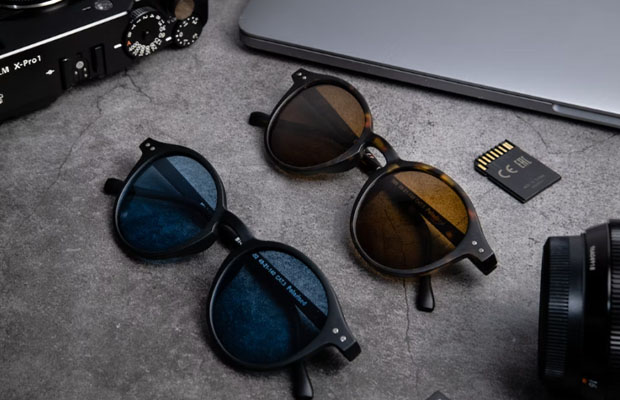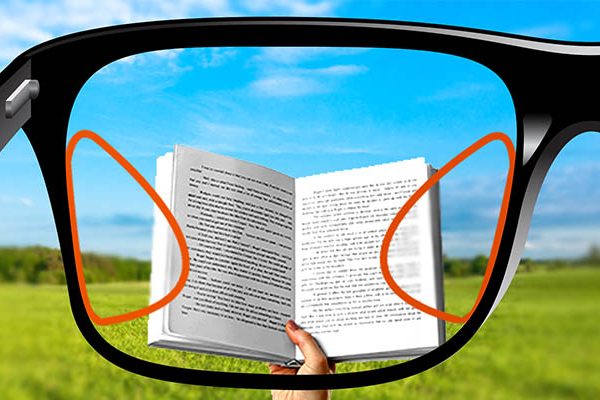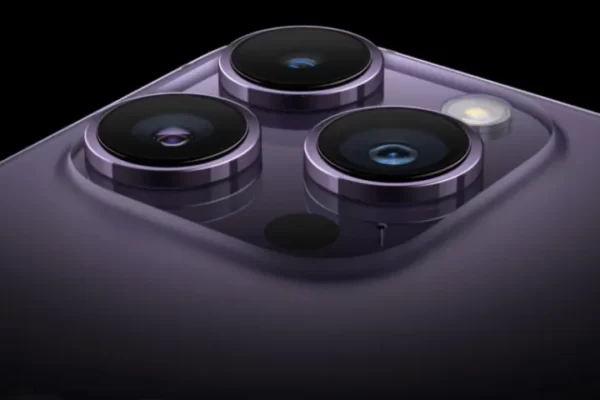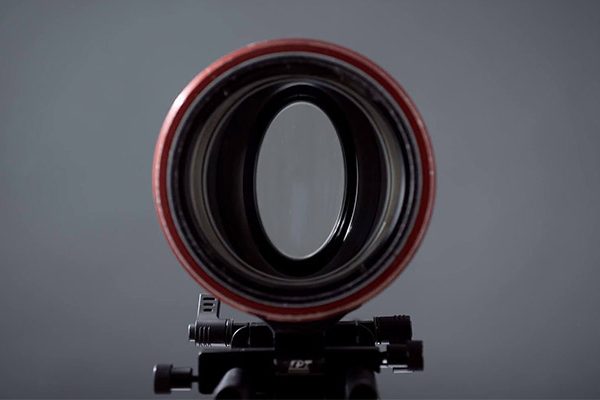Despite the sun’s many advantages, its light can seriously impair vision. Glare, which is not only annoying but frequently dangerous, can be produced by sunlight reflecting off flat roads, snow, or water.
Fortunately, polarized lenses can protect you from the risks posed by strong glare. They enhance visibility and sun safety as a result. During outdoor activities like working or playing, reflected light and glare can irritate you and even temporarily render you blind. Polarization can avert this potentially hazardous situation.
It’s simple to become perplexed with the variety of advanced lens technologies available. In this article, we address some of the most frequently asked queries about polarized vs. non-polarized lenses.
Related Article: What Is A Lens Hood For?
Table of Contents
What Are Polarized Lens?
Let’s talk briefly about sunlight and glare first. The majority of sunlight that reaches our eyes is dispersed because it reflects off unlevel surfaces (such as asphalt, grass, trees, etc.).). However, when sunlight reflects off a flat, shiny, smooth surface, such as the hood of a car or the calm surface of a body of water, the light is only reflected in one direction, creating distracting and possibly harmful glare.
All sunglasses are designed to block UV rays and reduce glare, but polarized lenses were created using a unique process to block out this kind of strong glare. Only a small amount of light can pass through this formulation, which functions almost like a blind or curtain.
Function Of Polarized Lenses
A unique chemical is applied to polarized lenses to filter light. The chemical molecules are arranged specifically to prevent some light from passing through the lens. Imagine it as a window treatment similar to a miniblind. The blinds’ openings allow only light to enter, which is all that can be seen.
A vertical opening for light is made by the filter on polarized sunglasses. These gaps can only accommodate light rays that are coming at your eyes from above. The lenses, for example, stop all horizontal light waves from refracting off of a smooth pond or a shiny car hood.
The image you see through polarized lenses is a little bit darker than usual as a result of this filtering. With polarized lenses, however, details are visible and objects appear clearer and crisper.
Advantages Of Polarized Sunglasses
To reduce the amount of reflecting light that enters the eye, lenses can be made with a nearly invisible filter. Additionally to reducing glare, polarized lenses enhance visual clarity and comfort by creating sharper, more distinct images. Polarized lenses are available for both prescription and non-prescription sunglasses, and they can be worn indoors by those who are sensitive to light, such as those who have recently undergone cataract surgery or those who are frequently exposed to strong sunlight through windows.
The majority of polarized sunglasses offer UV protection, which is crucial for preserving good eye health. It’s crucial to shield our eyes from UV rays in the same way that we do for our skin.
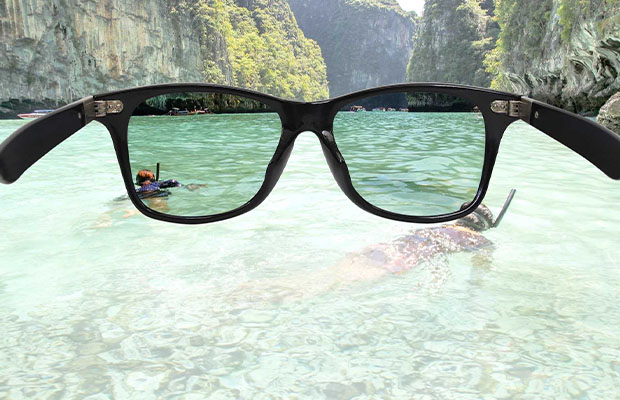
Disadvantages Of Polarized Lenses
There are some drawbacks to polarized lenses, despite the fact that they are excellent for shielding your eyes from bright light and reducing glare.
POLARIZED LENSES AREN’T GOOD FOR:
- Looking at LCD screens
- Flying
- Low-light situations and driving at night
- People whose sight may be sensitive to how the lenses change the lighting
LCD screens can be challenging to see through polarized lenses. Polarized lenses might not be your best choice if you need to be able to see a dashboard or screen for convenience or safety reasons.
Furthermore, they may not always be the best option for driving because they may react poorly to windshield tints.
The advantages of wearing tinted or polarized lenses at night are often exaggerated, so be wary of such statements. Driving with polarized lenses can occasionally be safe, but doing so at night can be risky.
If you already have difficulty seeing at night, the darkened lens can make it even more difficult to see in low light conditions.
If you’re unsure whether or not to use polarized lenses, consider speaking with an eye doctor about the best kind of eye protection for your needs.
Who Will Need Polarized Lenses?
Anyone who spends a lot of time outdoors should consider polarized lenses. Polarized lenses can help reduce glare and provide additional clarity while protecting your eyes while working outdoors, particularly when performing high-glare activities near water or snow.
Polarized lenses are just one of a wide range of options available for eye protection. If you’re spending a lot of time in the sun, you should protect not only your skin but also your eyes.
Time To Use Polarized Glasses
After hours of battling sun glare, users of polarized sunglasses frequently report feeling less worn out than usual. For most daily circumstances, polarized sunglasses can be a wise choice. Among the specific circumstances where polarized sunglasses may be especially beneficial are the following ones:
- Fishing. Polarized sunglasses significantly reduce glare and improve water visibility for fishermen.
- Boating. Eye fatigue can result from spending all day on the water. If you are operating a boat, it is also important to be able to see beneath the water’s surface better.
- Golfing. Some golfers believe that polarized lenses make it difficult to read greens accurately when putting, but studies haven’t all come to the same conclusion. Many golfers do find that polarized lenses lessen the glare on fairways, and if you prefer, you can take off your polarized sunglasses when putting them. Wearing polarized lenses also makes it easier to spot golf balls that end up in water hazards, even though you hope that never happens to you.
- most places that have snow. A pair of polarized sunglasses is typically a good choice because snow causes glare. See the list below to learn that wearing polarized sunglasses in snow may not be the best idea.
Time Not To Use Anti-glare Sunglasses
Polarized lenses should not be used in certain situations.
- Observing LCD (liquid crystal display) displays, such as:
- Car dashboard controls
- ATM cash machines
- Cell phones
- Some watches
- When glare or more light might be useful:
- To see ice on roads when driving
- To see icy patches when skiing
- When driving at night. When driving at night, you can purchase polarized glasses that are supposed to help reduce glare. When considering these glasses, proceed with caution. Driving at night while wearing polarized sunglasses could be detrimental.
Alternatives To Polarized Lenses
Polarized eyewear may be uncomfortable for some people, or they may not be permitted to wear them at work. There are substitutes available if you are unable to wear polarized lenses for any reason:
- Both reading glasses and sunglasses can be coated with an anti-reflective material.
- Mirrored sunglasses aid in reducing the amount of light that reaches your eyes.
- When exposed to a certain level of light, photochromic lenses automatically become darker.
Polarized Lenses Vs. Uv Protection
There is a difference between polarized and UV-protected lenses. It’s crucial to keep in mind that unless otherwise stated, polarized lenses do not offer UV protection.
Additionally, UV protection alone does not make a set of sunglasses effective at blocking glare and light reflections.
UV-protected lenses protect your eyes from damaging UV rays, which are associated with cataracts and other eye damage. Photokeratitis, or temporary blindness, can result from even brief exposure to strong UV rays. When you’re outside, it’s critical to wear sunglasses that offer 99 or 100% UV protection.
To avoid glare, however, you should look for sunglasses that are both polarized and UV-protective. UV lenses can’t do this.
Many polarized sunglasses on the market come with a UV protection coating, according to the American Academy of Ophthalmology. The next time you go sunglass shopping, make sure to read the tags on the sunglasses.
FAQs
Do all sunglasses offer the same level of UV defense?
No, every pair of sunglasses offers a different level of UV protection depending largely on the brand; some are more effective than others. For instance, TriLenium® technology is used in all Eagle Eyes polarized sunglasses, which filter 99.9% of UV rays and blue light.
Are all sunglass lenses polarized?
No, only a few sunglasses have polarizing technology, even though all sunglasses are intended to block UV rays. If it doesn’t say “polarized,” then it’s probably not because all polarized lenses are marked as such.
Where are polarized sunglasses most effectively used?
Driving, outdoor exercise, and water-related outdoor activities like water skiing, sailing, and fishing all benefit from polarized lenses.
Why does everything sometimes appear darker when using polarized lenses?
The polarized lens formula used in some brands of sunglasses can make objects appear darker, but Eagle Eyes is specifically formulated to improve contrast and definition without darkening.

